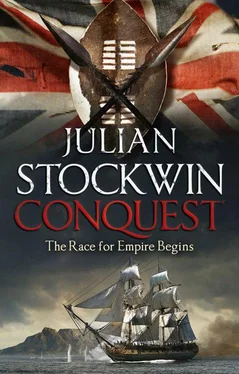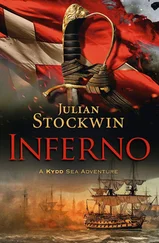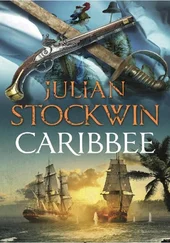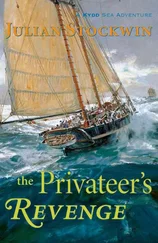Julian Stockwin - Conquest
Здесь есть возможность читать онлайн «Julian Stockwin - Conquest» весь текст электронной книги совершенно бесплатно (целиком полную версию без сокращений). В некоторых случаях можно слушать аудио, скачать через торрент в формате fb2 и присутствует краткое содержание. Жанр: Старинная литература, на английском языке. Описание произведения, (предисловие) а так же отзывы посетителей доступны на портале библиотеки ЛибКат.
- Название:Conquest
- Автор:
- Жанр:
- Год:неизвестен
- ISBN:нет данных
- Рейтинг книги:5 / 5. Голосов: 1
-
Избранное:Добавить в избранное
- Отзывы:
-
Ваша оценка:
- 100
- 1
- 2
- 3
- 4
- 5
Conquest: краткое содержание, описание и аннотация
Предлагаем к чтению аннотацию, описание, краткое содержание или предисловие (зависит от того, что написал сам автор книги «Conquest»). Если вы не нашли необходимую информацию о книге — напишите в комментариях, мы постараемся отыскать её.
Conquest — читать онлайн бесплатно полную книгу (весь текст) целиком
Ниже представлен текст книги, разбитый по страницам. Система сохранения места последней прочитанной страницы, позволяет с удобством читать онлайн бесплатно книгу «Conquest», без необходимости каждый раз заново искать на чём Вы остановились. Поставьте закладку, и сможете в любой момент перейти на страницу, на которой закончили чтение.
Интервал:
Закладка:
The discussion concluded tidily, formal written orders were issued and suddenly there was no more to be done. A toast to the health of Colonel Pack, who had indeed taken a bullet on the landing beach, and a final one to His Majesty, and it was time to retire.
Kydd found it hard to sleep in the hot dimness, smelling the reek of army canvas preservative. The dead feel of the earth under his campaign cot instead of the gentle heave of his ship was unnatural and the strange night sounds of the African bush – any one of which could have been the enemy closing in – were disquieting.
Well before dawn the camp was astir. After watch-keeping at sea Kydd was untroubled by the hour – it was rather what it implied: they were readying themselves for battle, and the first moves would be theirs.
He could sense the tension. The men were taking their breakfast quietly, his own brought by a stolid redcoat, who waited while he finished and then left noiselessly. He stayed where he was until first light stole in and a distant trumpeter played an elaborate air to be taken up on all sides. Shouted commands mingled. He heard the rush of feet and the occasional whinny of a horse on the cool morning air – and then massed drummers began a thunderous tattoo. It was the call to arms.
He emerged from the tent to see the battalions forming up in a complex pattern, the nearer column being dressed off by sergeant majors as if on a parade-ground, the other more distant, marching in file and then line, miraculously achieving a stronger cohesion at every manoeuvre.
A bewildering number of men were urgently about their business, quite ignoring why a naval captain should be wandering about – and then he heard a sound so out of place but so familiar he shook his head in bemusement: the clean shrill of a boatswain’s pipe sounding the ‘Tail on fall’, the demand for seamen to take up a tackle line.
It was the Sea Battalion, hundreds of sailors standing loosely in lines ahead of the field pieces, looking about them gleefully. He walked over to talk with their lieutenant-in-charge but was quickly spotted and, to his embarrassment, a spontaneous cheer went up. He doffed his hat – all ships must have been stripped of gun crews and there they were, in all their individuality, so different from the uniformity of identical files of soldiers – and his heart warmed to them.
Many wore a leather harness, which hooked on to the drag-rope shackled to the guns, six-pounders but with narrow iron-shod wheels that would dig into the sandy topsoil, turning them into a ferocious dead lump to pull. Two howitzers were also there, needing to be dragged into battle; squat army pieces that threw explosive shells and therefore had to be heavily constructed, brutes to move.
The hundreds not at the traces would either be hauling the howitzers, or carrying iron shot and powder. In addition each man was fully armed: a brace of pistols, cutlass and even a boarding pike. If the tide of battle went against them and the guns needed defending, they would do the job. Kydd tried not to think of how they could stand and fight against a sabre-wielding charge by heavy cavalry.
Baird and his staff were at the head of the army. Distinctive on a white charger, the general was in the centre of a group of splendidly attired officers, all mounted and in animated conversation.
As Kydd approached, a breathless young ensign found him. ‘S-Sir! Your horse!’ Despite a critical shortage of mounts on the battlefield it would be unthinkable that Kydd, a senior officer, should be seen on foot like a common soldier.
He climbed aboard awkwardly, the odd-looking brown creature clearly one of those lately gathered locally. It jibbed and snorted at Kydd’s alien scent, and he strove to subdue it while setting off cautiously to join the group around Baird.
‘Captain Kydd, sir,’ a colonel said urbanely, gesturing impatiently for him to approach nearer.
‘Sir. I’ve given my orders—’
‘Then I’ll wish you well of the day, sir,’ Baird said, briefly looking up from a paper. ‘For Brigadier General Ferguson this minute,’ he snapped, passing the document to a waiting subaltern, who cantered off through the assembling columns.
Kydd held well back while the forming up took place; it seemed to take hours but he knew that any weakness or overlooked detail might cost lives, even the action. It must be worse for the waiting soldiers: Baird had a good reputation in India but would that translate here to reckless abandon, given the stakes?
Finally, it was time, and the order to advance in general was given. Taking the lead Baird walked his horse slowly forward, closely followed by his staff. As they passed, the head of the column’s screamed commands started the tramp of feet and the monotonous ker-thump of a drum. Apparently the pipers were reserving their wind for the future.
It was unnerving. The scrubby landscape was flat and sandy, absorbing sound, and stretched away in a gentle rise ahead. There was no sign of the enemy, no hostile threat, but while Kydd was conscious of the army behind, he felt very exposed in the little group at the front. On the other hand he was witness to the grand spectacle of an army on the march into battle, which he knew he would never forget.
They stepped slowly on, the thousands of men marching in patient unison, standards aloft, squadron colours with their bearers.
After an hour or so the sun was making itself felt. The pale soil reflected the brightness and was quickly absorbing heat, radiating it up uncomfortably. There was no keen horizontal sea breeze here, only a hot, breathy, vertical shimmering.
A horse and rider appeared above the skyline at the ridge ahead and stopped. Another rose some distance to the left. Baird reined in and signalled a halt. Screamed commands echoed back and the drums abruptly stopped. An eerie silence slowly spread. Then the general urged his horse forward. Was this some sort of grave martial rite that must be performed before the two armies grappled in mortal combat?
Kydd followed with the others. Baird seemed hardly to notice the two riders, acknowledging their smart salutes with a distracted wave and peering intently ahead. Then Kydd understood: these were their own scouts and consequently the general must be in sight of the enemy.
They drew up level and he found himself along the top of a gentle ridge. There, spread out over the plain below, the Dutch host waited for them. With a tightening of his stomach Kydd saw what seemed to be an uncountable number of tiny figures in their battalions, which stretched squarely across their route.
He tried to take in the wider scene. To the right was the dull-blue monolithic bulk of Blaauwberg, a smaller mountain a little further on. To his left was the same flat, sandy scrub that stretched for some miles inland before another blue mountain range, a larger formation beyond. But straight before them was the gentle slope that led across the baking plain to the Dutch Batavian lines, and in the far distance, the grand sight of Table Mountain.
Baird had a telescope up and was quartering the ground in front of him with the utmost concentration. Around him his officers waited with patience: this was nothing less than decisions for the final commitment – if anything were overlooked, it would be too late to remedy in the heat of battle.
‘Um, a stern sight, sir,’ Kydd said hesitantly to the officer nearest him, who had holstered his telescope after his own survey and now sat calmly.
‘Possibly,’ the man said, with a curious glance at Kydd.
‘Sir, I’d be most obliged should you give me an account of what faces us.’
‘Very well.’ He deliberated for a moment, then said, ‘Before you are the Batavian lines in extended order as they are not expecting our cavalry to outflank them. On each wing is an artillery detachment with more in the centre, which I’m diverted to observe seem to be served by a species of Malay.
Читать дальшеИнтервал:
Закладка:
Похожие книги на «Conquest»
Представляем Вашему вниманию похожие книги на «Conquest» списком для выбора. Мы отобрали схожую по названию и смыслу литературу в надежде предоставить читателям больше вариантов отыскать новые, интересные, ещё непрочитанные произведения.
Обсуждение, отзывы о книге «Conquest» и просто собственные мнения читателей. Оставьте ваши комментарии, напишите, что Вы думаете о произведении, его смысле или главных героях. Укажите что конкретно понравилось, а что нет, и почему Вы так считаете.









